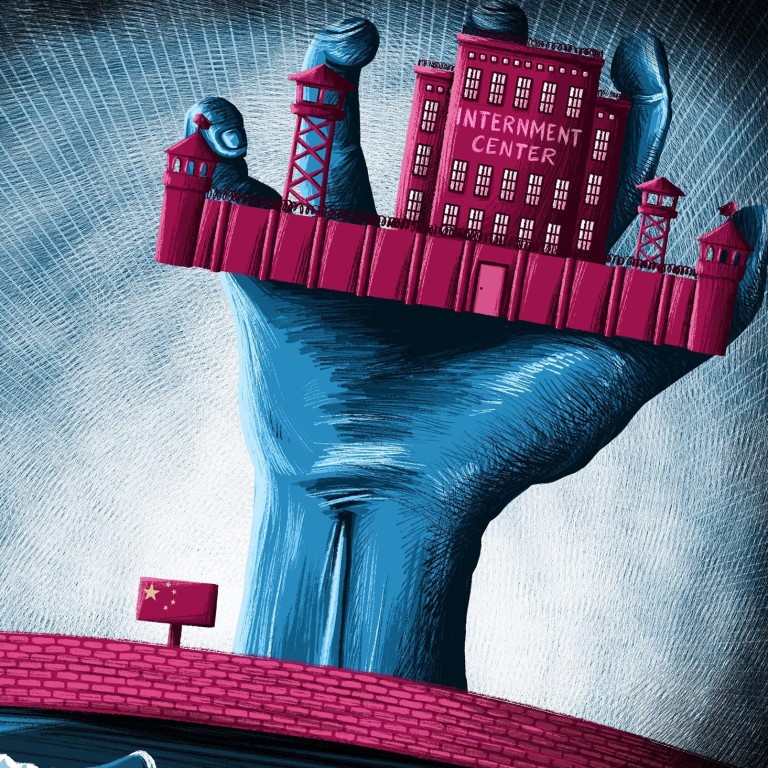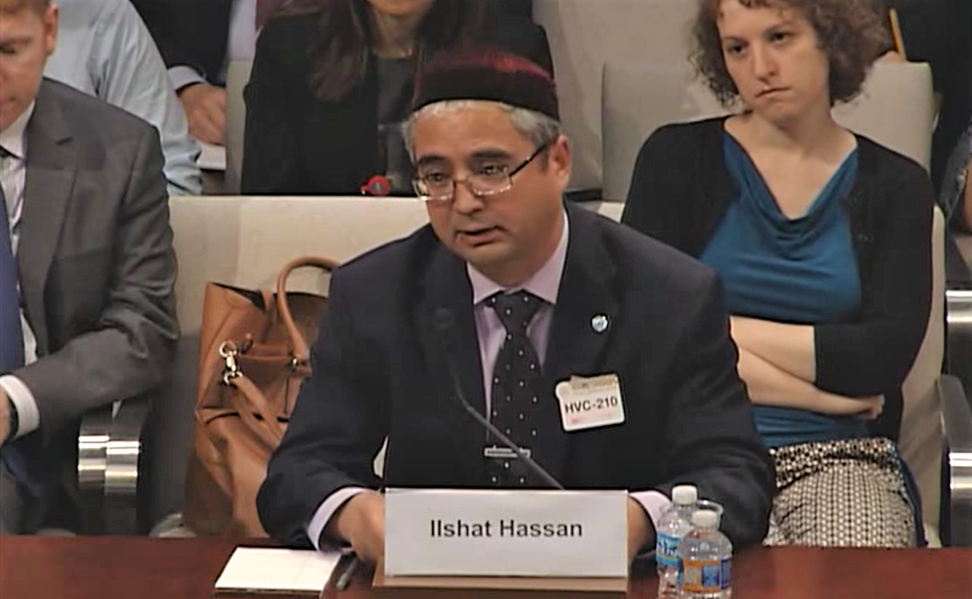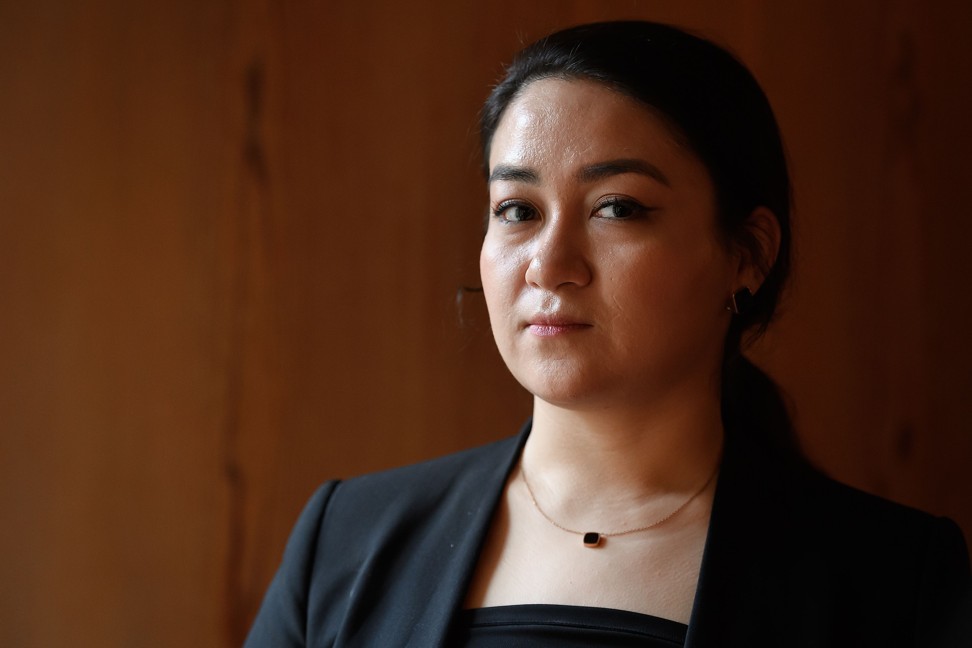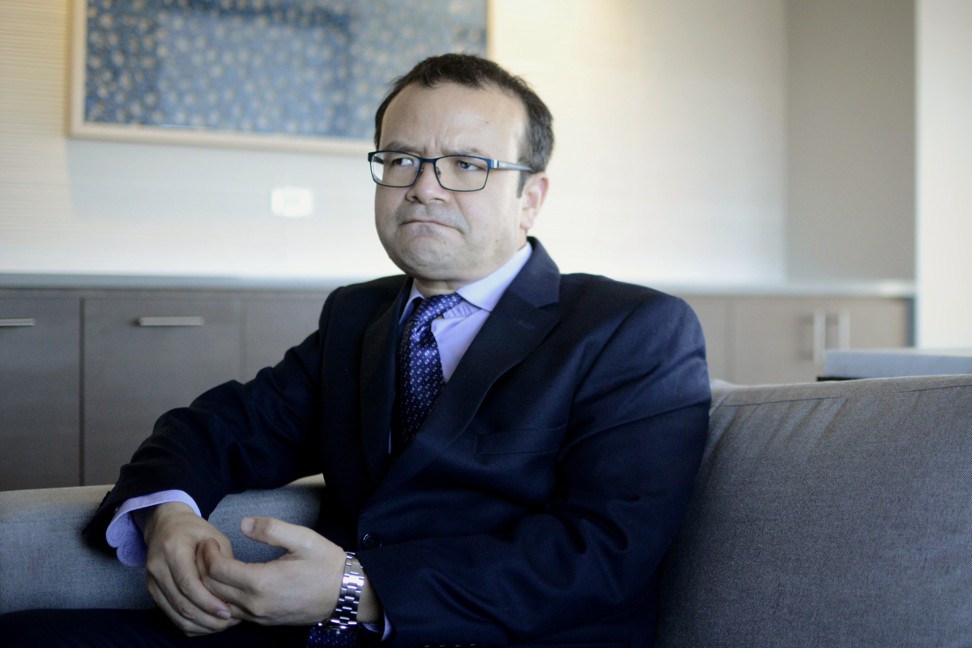
‘Psychological torture’: Uygurs abroad face mental health crisis over plight of relatives who remain in Xinjiang
- Activists say that even if Beijing’s crackdown can’t be stopped, steps can be taken to address the ‘secondary trauma’ of those who have fled
- Despite their struggles, some people don’t speak out and seek mental health counselling because of stigma and societal norms
Several years ago, Ilshat Hassan contemplated buying a gun. He was receiving threats over the phone and online from people who took issue with his advocacy for the Uygur people, he says, and feared for the safety of his family.
But his wife objected, and Hassan eventually abandoned the idea. They were both scared of the possibility that the state of his mental health could one day cause him to turn the firearm on himself.
“Hurting myself,” says Hassan, an IT professional living in Virginia. “That was my concern.”
Struggling with anxiety and depression, Hassan, 58, is just one of many members of the Uygur diaspora who say their mental health is in crisis, triggered or exacerbated by the situation facing family and friends thousands of miles away in China’s Xinjiang Uygur autonomous region.

Publicly, the government has portrayed the campaign as a humane and legitimate effort to counter “religious extremism”, setting up “vocational training centres” where “trainees” are taught the country’s laws and language and trained in practical skills.
Government documents not intended for public consumption, meanwhile, have detailed the involuntary nature of the internment programme and the political indoctrination that inmates are to receive.
China detains Muslims in Xinjiang for faith not extremism, leaked data shows
In 2018, the United Nations estimated that some 1 million people had been sent to the internment camps.
That has left many in the Uygur diaspora entirely in the dark about family members’ whereabouts and wellbeing. Hassan, for one, does not know whether his own mother is alive.
While Beijing’s measures within China have elicited a wave of castigation from governments and some limited policy responses, Uygurs abroad say their own psychological trauma is also in desperate need of attention, and could in fact be the arena where action is more likely to have a tangible impact.
“Practically we are not doing much for the people inside East Turkestan,” says Zubayra Shamseden of the Uygur Human Rights Project (UHRP), using a term by which many in the Uygur diaspora refer to Xinjiang.
Reports, statements and other forms of verbal pressure by organisations like hers have done little to effect real change in Beijing’s policies, she says. “But at least if you can do something and help people outside of East Turkestan, which is possible a million hundred per cent, that’s something that can give hope to [people still there].”
The Washington-based UHRP is currently seeking to partner with mental health providers and experts in self-care to produce multilingual materials that members of the Uygur diaspora around the world can access.
The true scale of demand for such support is difficult to quantify.
But across two 2018 surveys of members of the Uygur diaspora, conducted by a medical researcher at a prominent US university, more than 94 per cent of respondents said they experienced some form of mental health disorder, including depression, agitation, fatigue and inability to focus.
While not scientific, the online surveys garnered some 1,900 responses from Uygurs around the world, the majority adults. Fearing that his family members in Xinjiang could face reprisals for his work, the researcher who conducted the canvasing, a Uygur, did not want to be named.
New cache of Xinjiang papers ‘a manual for China’s detention camps’
One particular data point stood out to him: across the two surveys, around 1 in 5 respondents reported experiencing suicidal thoughts.
As Uygurs’ communications with relatives back in Xinjiang have been stymied, they have been stripped of a critical source of “moral support”, says the researcher, who himself has not spoken with anyone in his family since April 2017.
Some are unable to reach family because of their presumed internment. Some have been blocked on messaging apps or told by relatives not to communicate with them for fear they would face retribution by local authorities. Others, like Shamseden, have proactively made the decision not to attempt communication.
“I can ring right now but I’m scared, because if I ring, if they answer and if something happens [to them], what am I going to do?” she says. “The helplessness, the powerlessness, it’s just the most horrible thing in your life that you’ll ever experience.”
A bruising toll
During a recent visit to Geneva to attend a human rights conference, Uygur activist Jewher Ilham was asked a question that has become a staple of her meetings with government officials around the world: “What can we do to help the Uygurs?”
“I told them: ‘There is one thing that you are definitely able to do, and it won’t cost you too much money, it won’t cost you a bad relationship with China’,” Ilham says. “‘You can provide mental [health] support to the Uygurs. Give them free therapy’.”
Ilham, 25, knows full well the bruising toll that living outside of China while advocating for family within can have on one’s psychological well being.
In a coffee shop in Arlington, Virginia, she recounts several episodes in recent years in which she found herself grappling with her mental health. Among the triggering events was the sentencing of her father – the prominent Uygur scholar Ilham Tohti – to life in prison on separatism-related charges in September 2014.
Life in jail: unusually harsh sentence for Uygur scholar Ilham Tohti
Beijing accused the economics professor, who ran a bilingual Uygur-Mandarin website addressing ethnic, social and political tensions in the restive region, of seeking to split the country and inciting violence, charges Tohti denied.
Pain from the prospect of not seeing her father again was compounded by other anxieties. Would speaking up about his case make his situation worse? Would she be able to continue to fund her studies at Indiana University without her family’s financial support?
Then, two and a half years later, Ilham found herself at another nadir after the death of her mentor and close friend, the Tibet scholar Elliot Sperling. Forcibly estranged from her own father, she had come to see the professor as something of a paternal figure.

“My world collapsed,” Ilham says, recounting a period of two weeks when she skipped classes and exams, shut at home lost in tears. Her grief and isolation pushed her to the brink of giving up her advocacy work altogether: “I was in serious health problems.”
With the attentive company of a new roommate – who brought with her a puppy that became a source of therapy in itself – Ilham was able to recover her health and return to public activism, which last summer included an audience with US President Donald Trump in the Oval Office.
“If you can’t take good care of yourself,” she says now, “there’s no way you can take care of others.”
Though she has not sought it herself, Ilham believes that professional psychiatric care offers the best solution to the problems facing her community. But the stigma around mental health in more traditional Uygur circles is preventing some from speaking out and seeking help, she says, echoing the comments of several people interviewed for this story.
Though such a stigma can be found in cultures the world over, it is compounded by societal norms in China, where much of the Uygur diaspora hails from.
Additional barriers
According to figures from 2015, the most recent World Health Organisation (WHO) data available, China had just 2.2 psychiatrists for every 100,000 people. The US has more than four times the number at 10.5, while Norway, at the far end of the spectrum, has over 48.
“When you say, ‘I’m feeling depressed’, it’s: ‘Hey, don’t say that, you’re not crazy,’” says Ilham, playing out an imagined conversation between Uygurs. “People can get offended.”
Beyond cultural and social barriers, in a country like the US there is an additional financial burden associated with accessibility to mental health care.
“We probably will only see a sliver of the burden of illness that exists because of all sorts of systemic barriers,” says New York-based psychiatrist Sunny Patel, who has worked with asylum seekers, refugees and other displaced people dealing with trauma.
“Each step, each place, you always have to think about the cost because some places you have to pay a lot, even if you have insurance,” says UHRP’s Shamseden, referring to the co-payments required of many who have health insurance in the US. “That’s how it is. I just hate the system.”
The problem is compounded by the fact that many psychiatric practitioners do not even take insurance, placing all the burden on the patient, says Patel, a clinical fellow at New York University’s Langone hospital.
And while there are public health options for those on low incomes, it can be difficult to secure care that extends beyond one-off treatment, he adds, a critical hindrance for those living with chronic mental health problems.
“Who’s going to be able to see you on an ongoing basis when resources are limited?” he says.
Reliving the trauma
For those whose activism has brought them prominence within the Uygur community, that status often comes with an expectation that they be readily available to listen to others’ personal predicaments and offer constructive suggestions.
Ilham, for one, estimates that on an average day she expects to meet between 10 to 20 people with their own stories to share.
The constant need to express optimism is a form of “psychological torture”, says Abduweli Ayup, a Norway-based linguist and activist who runs an organisation providing assistance to displaced Uygurs, including camp survivors, as they settle in new host countries.
For Ayup, originally from western Xinjiang’s Kashgar, hearing others’ stories is in itself a traumatising experience, one that opens old wounds and leaves him grappling with insomnia.

In 2013, while living in Xinjiang, Ayup was arrested and imprisoned, accused of misappropriating public funds while operating an educational company that focused on promoting the Uygur language, the ethnic group’s Turkic mother tongue.
During his 15 months of imprisonment, Ayup says he was interrogated, tortured and abused – memories that come flooding back when he hears stories of others’ detention.
“I know what they are talking about,” says Ayup, 47, his voice audibly pained. “I know that cage in that interrogation room … I know what electricity feels [like].” (Faxed requests to the Chinese ministries of Foreign Affairs and Public Security for comment on Ayup’s detention went unanswered.)
In 2015, Ayup fled China and settled in Turkey, before moving to Norway, where he lives with his wife and two daughters.
China detains Muslims in Xinjiang for faith not extremism, leaked data shows
But despite living abroad and having lost contact with all his immediate family members in Xinjiang, the situation faced by those he left behind remains a painfully intimate subject for him, highlighted most recently by the leak of government documents in which he found a friend’s name.
The Qaraqash Document, as it came to be known in the international press, detailed authorities’ evaluation of hundreds of residents and their relatives in the southern Xinjiang county, including determinations of whether they should continue their forcible “re-education” or could be released. An abridged and redacted excerpt of the list was published widely in February.
Scouring its 137 pages, Ayup came across the name of his friend, identified as the owner of a kindergarten Ayup had visited before. The friend’s younger brother had been arrested and sent for “re-education” for violating family planning policies, notes in the document, seen by the South China Morning Post, said.
While the entire family was applauded by authorities for having undergone a “significant transformation in their thinking”, with the younger brother being released from his internment, the document was nonetheless an indication of how closely the lives of Uygurs in Xinjiang are monitored. It was a “heartbreaking” read, says Ayup.
‘That’s my therapy’
A polyglot and a linguistic scholar at heart, Ayup has found solace in his volunteer work in Bergen, where he teaches his mother tongue to Uygur-Norwegian children. “That’s my therapy,” he says, recounting his delight at hearing the words form clumsily and slowly in their mouths.
Ayup, whose family of four lives off his writing fellowship at the International Cities of Refuge Network (ICORN), has been able to access psychiatric care through Norway’s public health care system. But he says his sessions with therapists did not help.
“They asked me to stop,” he says, breaking into an incredulous laugh. “Stop thinking about that, stop doing [advocacy work] for a while. How can I stop? It’s impossible to stop. It’s me, I cannot deny myself.” (In fact, he doesn’t imagine stopping until he dies, which he hopes is years away: “I plan to live 80 years.”)
Patel, the psychiatrist, says advising people like Ayup to avoid the things that cause them pain is not at all best practice.
“Telling people to stop thinking about something is probably the worst thing you could say,” says Patel, arguing that the burden is on mental health practitioners to help patients make sense of – not ignore – their trauma and pain.
In severe cases, medication, when paired with psychotherapy, can have helpful “synergistic effects”, he says.
‘We are constantly under pressure’
But Hassan, who describes himself with a chuckle as “too traditional”, is reluctant to try medication, despite the disruption his symptoms have had on his daily life.
He used to finish books in a matter of days, but now finds himself reading a single page over and over again. He has come to crave isolation and struggles to concentrate at work. During a check-in with his professional mentor, he broke down in tears when she asked: “How is your life, Ilshat?”
Hassan’s company offers counselling, and he acknowledges that he “should go”. But holding him back is the belief that short of losing his memory, there is nothing that could soothe his psychological torment.
“We are constantly under this pressure, it’s not going away,” he says, pointing to the fact he has not been able to contact his mother and sister for several years. “I don’t know if they are still alive. After I talk to a counsellor, anything changes? No.”
Hassan’s young daughter is a source of hope and a welcome distraction from his pain, he says. But, like anything in his life, even she has the unwitting ability to turn his mind back to Xinjiang.
Sometimes she will ask why her grandparents do not pick her up from school like her classmates. Does she have any extended family at all?
“And after ‘Yes’, you have to explain to her … why she can’t talk to them,” says Hassan, heavily. “It’s a very stressful conversation.”
Additional reporting by Mimi Lau
Purchase the China AI Report 2020 brought to you by SCMP Research and enjoy a 20% discount (original price US$400). This 60-page all new intelligence report gives you first-hand insights and analysis into the latest industry developments and intelligence about China AI. Get exclusive access to our webinars for continuous learning, and interact with China AI executives in live Q&A. Offer valid until 31 March 2020.

